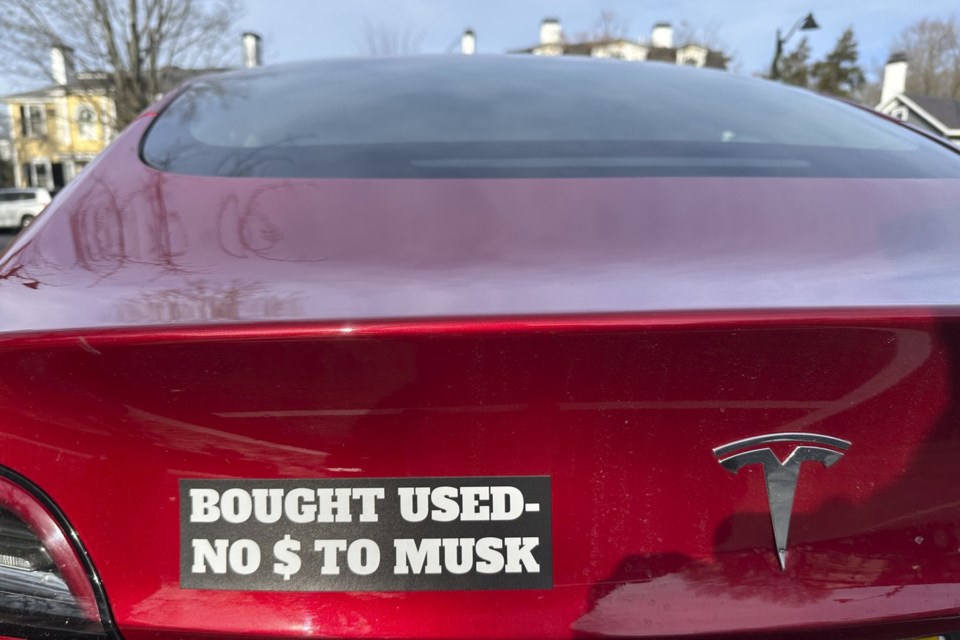MONTREAL — Stéphane Pascalon's Tesla fan club brings people together to share their pride for the company's cars, but that pride has turned into shame for some, and now the club plans to distribute hundreds of bumper stickers so owners can distance themselves from CEO Elon Musk.
The club recently conducted a survey among its members showing that about 80 per cent of respondents wanted to dissociate from Musk, the divisive head of Tesla and high-level adviser to U.S. President Donald Trump. About 50 per cent said they did not want to participate in public Tesla events, Pascalon, president of Club Tesla Quebec, said in a recent interview.
“Previously, they were very proud of their car and now we can see that the actions of Elon Musk really divide people, so it's more difficult to be proud of having a Tesla today,” Pascalon said. The bumper stickers his group plans on distributing show a Tesla logo in a green heart, beside the name “Elon” on a stop sign.
Musk, one of the world's richest men, has been involved in a tide of controversies including making what appeared to be a Nazi salute at Trump's inauguration, publicly voicing support for the far-right Alternative for Germany, and trying to access sensitive personal data for millions of Americans in his quest to cut U.S. government spending. The impact of the EV mogul's actions are also being felt in Canada.
Pascalon has heard of several instances from the club's 1,700 members in which Tesla owners were shown the middle finger or treated aggressively on the road because of anger toward Musk. About four per cent of survey respondents said they were not planning to buy a Tesla as their next EV purchase and a smaller fraction wanted to sell the Tesla vehicles they currently own, he said.
Meanwhile, Vancouver police said Wednesday they were investigating a case of vandalism at a Tesla dealership, in which an obscene remark about Musk was spray-painted on an exterior wall overnight between Saturday and Sunday. A Reddit post showing the graffiti received thousands of votes of approval.
The remark had been scrubbed off the wall by Wednesday but could still be made out. Staff members declined to comment. Vancouver Police Department spokeswoman Tania Visintin said no arrests were made and the file is under investigation.
A Tesla service centre in Langford on Vancouver Island is being targeted as part of a worldwide protest on Saturday.
Earlier this month, Politico reported that a Tesla car showroom in the Netherlands was graffitied with swastikas and anti-fascist slogans, and protesters defaced a Tesla factory in Germany in January.
Tim Burrows, a board member of Electric Vehicle Society, a non-profit organization that advocates for electric mobility in Canada, said he expects a dip in sales because of anti-Musk sentiment. “I know of at least one person personally who was preparing to purchase a Tesla … within the next month or two and who has since decided to go a different way,” he said in a recent interview.
Tesla has also become a target of Canadian politicians. On Monday, federal NDP Leader Jagmeet Singh said Canada should respond to Trump's tariff threats against Canada by charging 100 per cent tariffs on Tesla vehicles; in January Liberal Party leadership candidate Chrystia Freeland also suggested that Canada should target Tesla with tariffs if Trump goes through with his threats.
Tesla does not release sales figures for Canada but rebate data from Transport Canada’s zero-emission vehicle program suggests about 33,000 Teslas received rebates for new purchases in the nine months to Dec. 31. On a per-month basis, that is down about 15 per cent compared to the approximately 50,000 Teslas that received the rebates in the 2023-24 fiscal year.
Despite shifting attitudes, Pascalon says it’s still better to own a Tesla or other electric vehicle compared to one that is gas-powered, to reduce greenhouse gas emissions, regardless of Musk's actions.
Burrows says he is concerned that Musk’s presence at Tesla, a major player in the EV industry, will end up setting back a transition to electric vehicles more generally.
“I think it's going to slow down EV adoption in Canada, and I think we're also seeing fewer purchase incentives in play, which we know has a significant impact. All of these things are creating some big headwinds for electrification.”
This report by The Canadian Press was first published Feb. 14, 2025.
—With files from Nono Shen in Vancouver.
Joe Bongiorno, The Canadian Press

